中西方时间观念差异 英文
- 格式:doc
- 大小:13.50 KB
- 文档页数:1

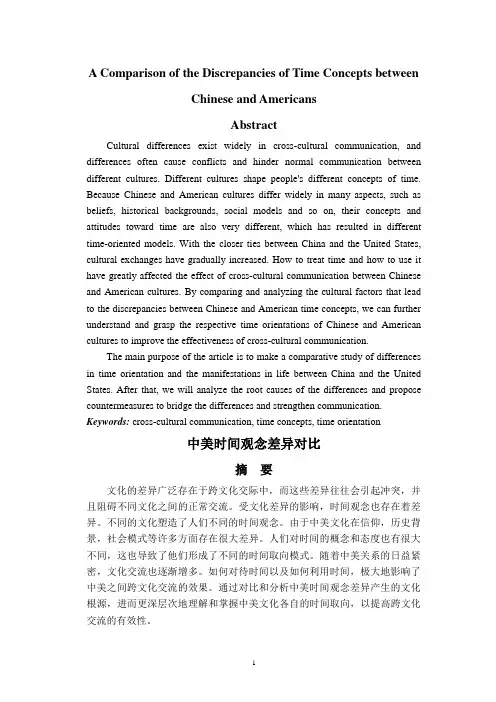
A Comparison of the Discrepancies of Time Concepts betweenChinese and AmericansAbstractCultural differences exist widely in cross-cultural communication, and differences often cause conflicts and hinder normal communication between different cultures. Different cultures shape people's different concepts of time. Because Chinese and American cultures differ widely in many aspects, such as beliefs, historical backgrounds, social models and so on, their concepts and attitudes toward time are also very different, which has resulted in different time-oriented models. With the closer ties between China and the United States, cultural exchanges have gradually increased. How to treat time and how to use it have greatly affected the effect of cross-cultural communication between Chinese and American cultures. By comparing and analyzing the cultural factors that lead to the discrepancies between Chinese and American time concepts, we can further understand and grasp the respective time orientations of Chinese and American cultures to improve the effectiveness of cross-cultural communication.The main purpose of the article is to make a comparative study of differences in time orientation and the manifestations in life between China and the United States. After that, we will analyze the root causes of the differences and propose countermeasures to bridge the differences and strengthen communication. Keywords: cross-cultural communication, time concepts, time orientation中美时间观念差异对比摘要文化的差异广泛存在于跨文化交际中,而这些差异往往会引起冲突,并且阻碍不同文化之间的正常交流。
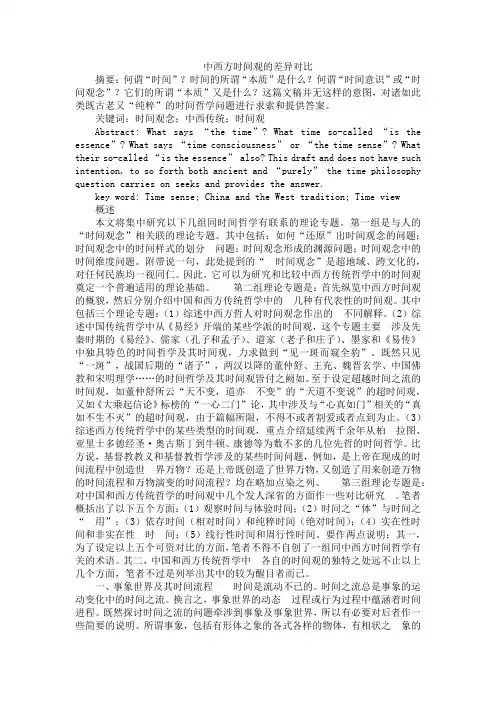
中西方时间观的差异对比摘要:何谓“时间”?时间的所谓“本质”是什么?何谓“时间意识”或“时间观念”?它们的所谓“本质”又是什么?这篇文稿并无这样的意图,对诸如此类既古老又“纯粹”的时间哲学问题进行求索和提供答案。
关键词:时间观念;中西传统;时间观Abstract: What says “the time”? What time so-called “is the essence”? What says “time consciousness” or “the time sense”? What their so-called “is the essence” also? This draft and does not have such intention, to so forth both ancient and “purely” the tim e philosophy question carries on seeks and provides the answer.key word: Time sense; China and the West tradition; Time view 概述本文将集中研究以下几组同时间哲学有联系的理论专题。
第一组是与人的“时间观念”相关联的理论专题。
其中包括:如何“还原”出时间观念的问题;时间观念中的时间样式的划分问题;时间观念形成的渊源问题;时间观念中的时间维度问题。
附带说一句,此处提到的“时间观念”是超地域、跨文化的,对任何民族均一视同仁。
因此,它可以为研究和比较中西方传统哲学中的时间观奠定一个普遍适用的理论基础。
第二组理论专题是:首先纵览中西方时间观的概貌,然后分别介绍中国和西方传统哲学中的几种有代表性的时间观。
其中包括三个理论专题:(1)综述中西方哲人对时间观念作出的不同解释。
(2)综述中国传统哲学中从《易经》开端的某些学派的时间观,这个专题主要涉及先秦时期的《易经》、儒家(孔子和孟子)、道家(老子和庄子)、墨家和《易传》中独具特色的时间哲学及其时间观,力求做到“见一斑而窥全豹”。
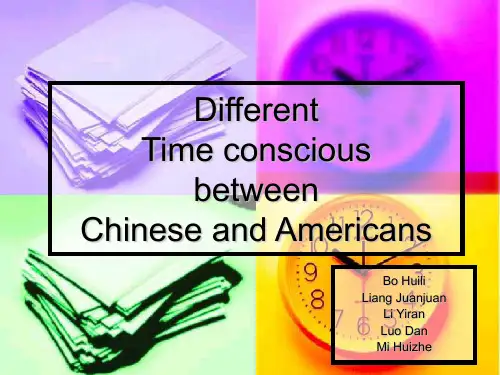
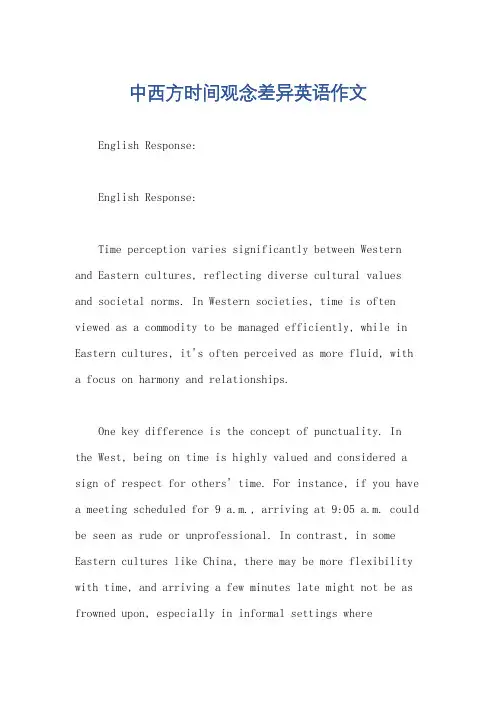
中西方时间观念差异英语作文English Response:English Response:Time perception varies significantly between Western and Eastern cultures, reflecting diverse cultural values and societal norms. In Western societies, time is often viewed as a commodity to be managed efficiently, while in Eastern cultures, it's often perceived as more fluid, with a focus on harmony and relationships.One key difference is the concept of punctuality. In the West, being on time is highly valued and considered a sign of respect for others' time. For instance, if you have a meeting scheduled for 9 a.m., arriving at 9:05 a.m. could be seen as rude or unprofessional. In contrast, in some Eastern cultures like China, there may be more flexibility with time, and arriving a few minutes late might not be as frowned upon, especially in informal settings wherepersonal relationships matter more than strict adherence to schedules.Another aspect is the pace of life. Western societies often prioritize efficiency and productivity, leading to a fast-paced lifestyle where people are constantly busy and multitasking. Phrases like "time is money" emphasize the importance of using time wisely to achieve success. On the other hand, Eastern cultures may value a slower pace of life, allowing time for contemplation, leisure, and connection with others. In Japan, for example, the concept of "Ma" refers to the interval between events, emphasizing the beauty of pauses and silence in enhancing experiences.Furthermore, attitudes towards the future also differ. Western cultures tend to have a future-oriented mindset, where planning and goal-setting are highly emphasized. People are encouraged to think ahead, set long-term objectives, and work towards achieving them systematically. In contrast, some Eastern cultures, such as those influenced by Confucianism, may prioritize the present moment and place greater importance on maintaining harmonyin interpersonal relationships. This can be seen in phrases like "活在当下" (live in the moment) in Chinese culture, emphasizing the significance of cherishing the present instead of constantly worrying about the future.In conclusion, while both Western and Eastern cultures have their own unique perspectives on time, understanding and respecting these differences can facilitate effective communication and collaboration in today's globalized world.中文回答:时间观念在西方和东方文化中存在显著差异,反映了不同的文化价值观和社会规范。
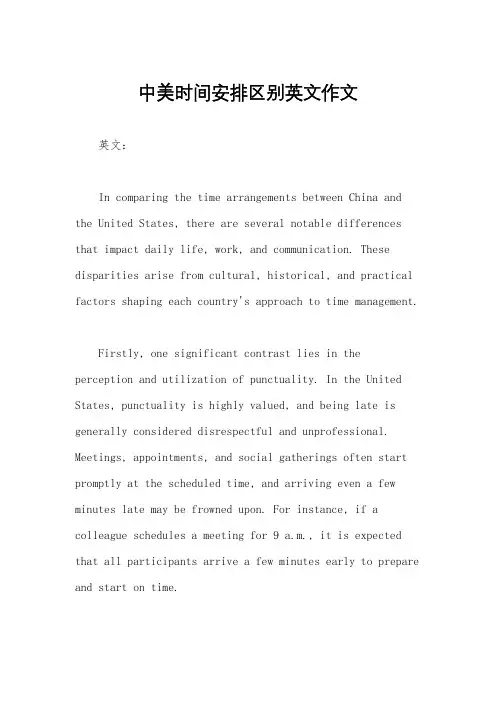
中美时间安排区别英文作文英文:In comparing the time arrangements between China and the United States, there are several notable differences that impact daily life, work, and communication. These disparities arise from cultural, historical, and practical factors shaping each country's approach to time management.Firstly, one significant contrast lies in the perception and utilization of punctuality. In the United States, punctuality is highly valued, and being late is generally considered disrespectful and unprofessional. Meetings, appointments, and social gatherings often start promptly at the scheduled time, and arriving even a few minutes late may be frowned upon. For instance, if a colleague schedules a meeting for 9 a.m., it is expected that all participants arrive a few minutes early to prepare and start on time.In China, while punctuality is still important in many contexts, there is often more flexibility regarding time arrangements. Social gatherings, for example, may have a designated start time, but it is common for attendees to arrive gradually over an extended period. This relaxed attitude towards punctuality is often influenced by the concept of "中国时间" (zhōngguó shíjiān), loosely translated as "Chinese time," which suggests a more fluid interpretation of schedules.Another notable difference is the structure of the typical workday. In the United States, the standard workweek typically consists of five days, from Monday to Friday, with weekends off. Office hours typically start around 9 a.m. and end around 5 p.m., although this can vary depending on the industry and individual workplace policies. Additionally, there is a strong emphasis on work-life balance, with many companies offering flexible work arrangements and paid time off for vacations and personal matters.On the other hand, in China, the workweek traditionallyspans from Monday to Saturday, with Sunday designated as the primary day off. Office hours may also vary but generally extend later into the evening compared to the United States, with it being common for employees to work beyond the standard 9-to-5 schedule. However, like in the U.S., there is a growing awareness of the importance of work-life balance, and some companies are adopting more flexible policies to accommodate employees' personal needs.Communication styles also differ between the two countries, which can influence time arrangements. In the United States, direct and straightforward communication is often preferred, with individuals valuing concise and efficient exchanges. This can manifest in the way meetings are conducted, with agendas outlined in advance, and discussions kept on track to ensure time is used efficiently.In China, communication tends to be more indirect, with an emphasis on maintaining harmony and saving face. This can sometimes lead to longer discussions and decisions taking more time to reach consensus. As a result, meetingsand negotiations may require more patience and flexibility regarding time management.Overall, while both China and the United States prioritize effective time management, there are distinct differences in how time is perceived, scheduled, and utilized in various aspects of daily life, work, and communication.中文:在比较中美两国的时间安排时,有几个显著的差异影响着日常生活、工作和沟通。

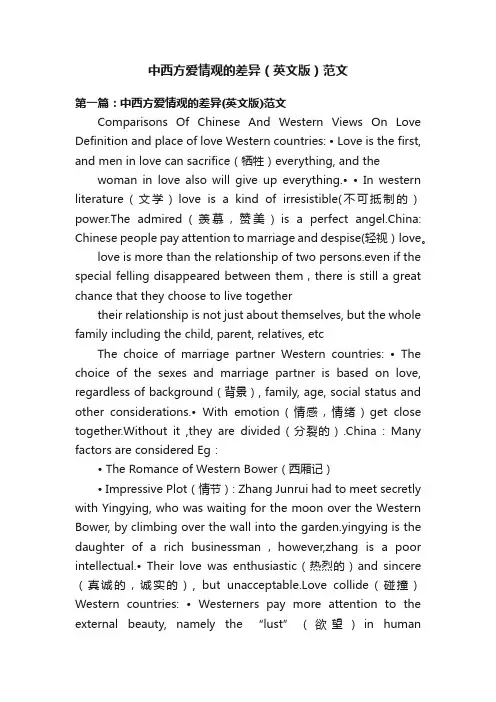
中西方爱情观的差异(英文版)范文第一篇:中西方爱情观的差异(英文版)范文Comparisons Of Chinese And Western Views On Love Definition and place of love Western countries: • Love is the first, and men in love can sacrifice(牺牲)everything, and the woman in love also will give up everything.• • In western literature(文学)love is a kind of irresistible(不可抵制的)power.The admired(羡慕,赞美)is a perfect angel.China: Chinese people pay attention to marriage and despise(轻视)love。
love is more than the relationship of two persons.even if the special felling disappeared between them,there is still a great chance that they choose to live togethertheir relationship is not just about themselves, but the whole family including the child, parent, relatives, etcThe choice of marriage partner Western countries: • The choice of the sexes and marriage partner is based on love, regardless of background(背景), family, age, social status and other considerations.• With emotion(情感,情绪)get close together.Without it ,they are divided(分裂的).China : Many factors are considered Eg:• The Romance of Western Bower(西厢记)• Impressive Plot(情节): Zhang Junrui had to meet secretly with Yingying, who was waiting for the moon over the Western Bower, by climbing over the wall into the garden.yingying is the daughter of a rich businessman,however,zhang is a poor intellectual.• Their love was enthusiastic(热烈的)and sincere (真诚的,诚实的), but unacceptable.Love collide(碰撞)Western countries: • Westerners pay more attention to the external beauty, namely the “lust”(欲望)in humannature.Example: Romeo and Juliet Romeo and Juliet falling in love at first sight is based on both sides of the beauty.They don’t have deep communications.They make judgments according to the impressions(观感)of the opposite(对面的)person’s looks.China: The Oriental(东方人的)pay more attention to the inner beauty, namely “passion"(激情,热情)side in human nature.Example: Liang Shanbo and Zhu Yingtai Liang Shanbo and Zhu Yingtai have quite a long time for communications such as three years’ classmates reading.In daily contact, Zhu Yingtai was attracted by Liang’s talent and connotation(内涵)and gave him her heart.The expressions of loveWestern countries: Direct and straightforward(坦率的)frankly、open、romantic、egardless(不注意的)of everything Eg:'I loved you.I never shall.That's the truth, Roy.I never shall.' ‘我爱你,从未爱过别人,永远不会,这是真的,罗伊,永远不会。

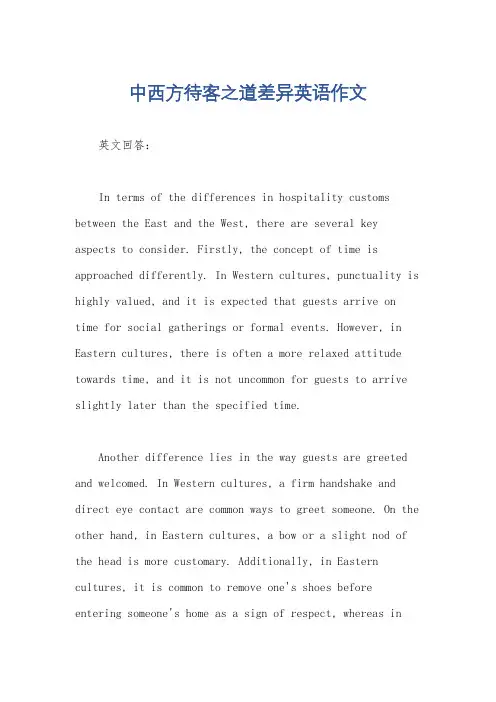
中西方待客之道差异英语作文英文回答:In terms of the differences in hospitality customs between the East and the West, there are several key aspects to consider. Firstly, the concept of time is approached differently. In Western cultures, punctuality is highly valued, and it is expected that guests arrive on time for social gatherings or formal events. However, in Eastern cultures, there is often a more relaxed attitude towards time, and it is not uncommon for guests to arrive slightly later than the specified time.Another difference lies in the way guests are greeted and welcomed. In Western cultures, a firm handshake and direct eye contact are common ways to greet someone. On the other hand, in Eastern cultures, a bow or a slight nod of the head is more customary. Additionally, in Eastern cultures, it is common to remove one's shoes before entering someone's home as a sign of respect, whereas inWestern cultures, this practice is less prevalent.The way meals are conducted also differs between the East and the West. In Western cultures, it is typical for each individual to have their own plate of food, and utensils such as knives, forks, and spoons are used to eat. In contrast, in many Eastern cultures, meals are often served family-style, with multiple dishes placed in the center of the table for everyone to share. Chopsticks are commonly used as eating utensils in many Eastern countries.Furthermore, the concept of personal space varies between the East and the West. In Western cultures, individuals tend to value their personal space and prefer to have some distance between themselves and others, especially when conversing. However, in Eastern cultures, physical proximity is often more accepted, and it is not uncommon for people to stand or sit closer to each other during conversations.中文回答:在东西方的待客之道差异方面,有几个关键方面需要考虑。
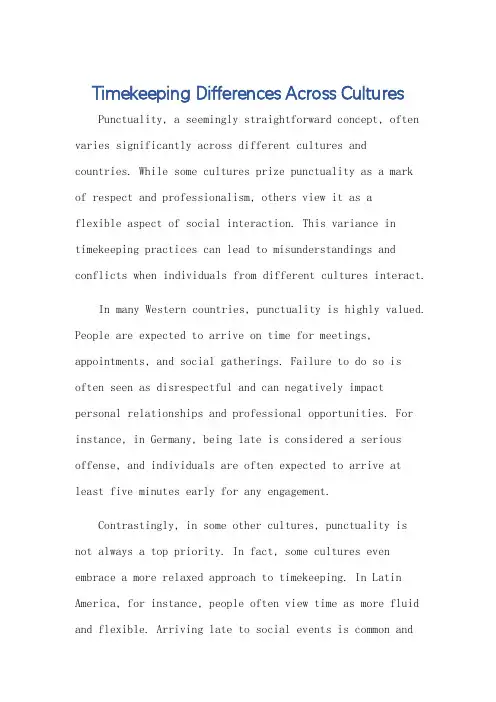
Timekeeping Differences Across CulturesPunctuality, a seemingly straightforward concept, often varies significantly across different cultures and countries. While some cultures prize punctuality as a markof respect and professionalism, others view it as aflexible aspect of social interaction. This variance in timekeeping practices can lead to misunderstandings and conflicts when individuals from different cultures interact. In many Western countries, punctuality is highly valued. People are expected to arrive on time for meetings, appointments, and social gatherings. Failure to do so is often seen as disrespectful and can negatively impact personal relationships and professional opportunities. For instance, in Germany, being late is considered a serious offense, and individuals are often expected to arrive at least five minutes early for any engagement.Contrastingly, in some other cultures, punctuality isnot always a top priority. In fact, some cultures even embrace a more relaxed approach to timekeeping. In Latin America, for instance, people often view time as more fluid and flexible. Arriving late to social events is common andis often seen as a sign of friendliness and informality. Similarly, in some Asian cultures, such as India and Thailand, being late is sometimes accepted due to the influence of factors like traffic congestion or the importance of personal relationships.The reasons for these differences in timekeeping practices are numerous. Cultural norms, historical traditions, and social expectations all play a role in shaping individual and collective views on punctuality. Additionally, economic factors, such as the pace of life in a given society, can also influence timekeeping habits. For instance, in fast-paced economies like the United States or Japan, where the work culture often demands efficiency and productivity, punctuality is often seen as crucial.However, it's important to note that while punctuality may vary across cultures, the importance of respecting others' time remains universal. When interacting with individuals from different cultures, it's crucial to understand and accommodate their timekeeping practices. This can help avoid misunderstandings and foster better cross-cultural communication and understanding.Moreover, in today's globalized world, where international business and cultural exchanges are becoming increasingly common, it's beneficial to be aware of and adaptive to diverse timekeeping norms. By doing so, individuals and organizations can enhance their effectiveness and establish positive relationships with people from diverse backgrounds.In conclusion, while punctuality may differ across cultures, understanding and respecting these differences are crucial for successful cross-cultural interactions. By embracing a flexible and understanding approach to timekeeping, we can foster a more inclusive and harmonious global community.**守时在不同文化中的差异**守时,这个看似简单的概念,在不同的文化和国家中却存在显著的差异。
中西方时间观念差异英文第一篇:中西方时间观念差异英文The concept of time(时间观念)①In china,words and phrases about time are very general.For example,if you date with someone, most of Chinese used to answer: in the afternoon /at night/after a while and so on.But in western, people have a very strong concept of time.If you date with a foreigner, they will ask you the Specific time, such as: what time should we meet?②In Chinese dating, people would like to come in advance and they think its represent respect and politeness.Westerners like come to the dating place on time or a few minutes late, which can give each other fully time to prepare and the enough private space.They think that arriving on time shows people have good education.Otherwise he will be regarded as unreliable or is not responsible for the other people.第二篇:中西方家庭教育观念的六大差异中西方家庭教育观念的六大差异由于历史传统、社会文化背景的不同,中西方家庭教育观念存在着巨大的差异,从这些差异中,我们可以找出许多值得中国家长学习的观念和做法。
中西方差异的英语作文英文回答:As a bilingual individual who has lived in both Western and Eastern cultures, I have noticed several differences between the two. One of the most obvious differences is the way people communicate and express themselves.In Western cultures, people tend to be more direct and upfront in their communication. For example, if someone doesn't like something, they will usually say it directly without beating around the bush. This directness can sometimes be seen as rude or aggressive in Eastern cultures, where people tend to use more indirect and polite languageto express their opinions.In addition, the use of body language and gestures also differs between the two cultures. In Western cultures, people are more likely to use hand gestures and maintaineye contact during conversations to show engagement andinterest. On the other hand, in Eastern cultures, people may use more subtle gestures and avoid direct eye contact as a sign of respect.Furthermore, the concept of time is another area where the two cultures differ. In Western cultures, time is often seen as a limited resource, and punctuality is highly valued. People are expected to be on time for appointments and meetings. In contrast, in Eastern cultures, time is more fluid, and being a few minutes late is often not a big deal.Another notable difference is the attitude towards personal space. In Western cultures, people tend to have a larger personal space bubble and may feel uncomfortable with too much physical proximity. In Eastern cultures, however, people are more accustomed to being in close physical proximity and may not feel the same level of discomfort.中文回答:作为一个能说两种语言的人,在西方和东方文化中生活过的我,注意到了两者之间的一些差异。
中外时间观念差异英语作文Time perception varies greatly between Chinese and Western cultures. In China, time is often seen as aflexible concept. People are more likely to adjust their schedules based on the needs of the moment, whether it's a social gathering or a business meeting. Arriving a few minutes late is often acceptable, especially if there's a good reason behind it.On the other hand, in many Western cultures, time is considered a precious commodity. Punctuality is highly valued, and arriving early or on time for an appointment or meeting is expected. Delays are seen as disrespectful, and can lead to negative consequences, like missing opportunities or damaging relationships.Chinese society often emphasizes the importance of spending quality time with family and friends. This means that work and personal life are often intertwined, and time is shared freely between the two. A casual lunch or after-work drink can easily last for hours, with no fixed schedule or agenda.Contrastingly, in Western cultures, work and personal time are often strictly separated. Once the workday ends, people tend to focus on their personal lives, leaving work-related matters behind. Appointments and meetings are scheduled with precision, and any deviation from the plan.。
中西方时间观念差异英语作文Differences in Time Consciousness between the East and the WestTime consciousness varies significantly between the East and the West. These differences can have an impact on various aspects of life, including work, social interactions, and personal schedules.In Western cultures, time is often seen as linear and quantitative. Punctuality is highly valued, and deadlines are strictly followed. Schedules are carefully planned, and meetings and appointments are usually scheduled in advance with specific start and end times. Being on time is considered a sign of respect and professionalism.In contrast, in some Eastern cultures, time is perceived more as a flexible and fluid concept. The focus is not solely on precise timekeeping but rather on achieving a certain level of completion or accomplishment. There may be a greater tolerance for delays and a more relaxed approach to schedules. Relationships and the context of the situation may take precedence over strict adherence to time.These differences can lead to misunderstandings and challenges in cross-cultural interactions. For example, in a Western business setting, being late for a meeting may be seen as unprofessional, while in some Eastern contexts, it might not hold the same significance.Understanding and respecting these time观念differences is essential in building effective relationships and successful communication across cultures. It is important to be aware of and adapt to the time expectations of different cultures when engaging in international collaborations or traveling abroad.This essay highlights the key differences in time consciousness between the East and the West, but it is important to note that these are generalizations and individual variations exist within each culture. By acknowledging and embracing these differences, we can enhance our intercultural competence and navigate diverse time-oriented situations more gracefully.。
The concept of time(时间观念)People of different cultural backgrounds have different sense of timeIn china,words and phrases about time are very general. For example,if you date with someone, most of Chinese used to answer: in the afternoon /after a while and so on.But in western, people have a very strong concept of time. If you date with a foreigner, they will ask you the Specific time, such as: what time should we meet?在中国,关于时间的单词和短语很一般。
例如,如果你和某人约会,大多数中国用于回答:下午/晚上/后一段时间等等。
但是在西方,人们有很强的时间观念。
如果你和一个外国人约会,他们会问你的具体时间,如:我们什么时间见面?In Chinese dating, people would like to come in advance and they think its represent respect. Westerners like to come to the dating place on time or a few minutes late, which can give each other fully time to prepare and the enough private space. They think that arriving on time shows people have good education. Otherwise he will be regarded as unreliable or is not responsible for the other people.在中国的相亲,人们想提前来,他们认为它表示尊重和礼貌。
中西文化差异英文简短中西文化差异是一个复杂而广泛的话题,以下是一些简短的英文描述:1.Value Systems(价值体系): Western culture emphasizes individualism, independence, and personal achievements, while Chinese culture highlights collectivism, interdependence, and harmony within the group.2.Communication Styles(交流方式): Direct and assertive communication is preferred in Western cultures, whereas indirect and polite communication is valued in Chinese culture to maintain social harmony.3.Time Orientation(时间观念): Western cultures tend to be future-oriented, emphasizing planning and scheduling, while Chinese culture is more present-oriented, focusing on the importance of the moment and relationships.4.Social Etiquette(社交礼仪): In Western cultures, people often maintain a personal distance and privacy, while inChinese culture, there is a greater emphasis on social connections, networking, and saving face.5.Perception of Authority(权威观念): Western cultures generally have a more democratic approach and value challenging authority, whereas Chinese culture places a high degree of respect for elders, hierarchy, and tradition.请注意,这些只是一些一般性观察,并不能涵盖所有个体情况。